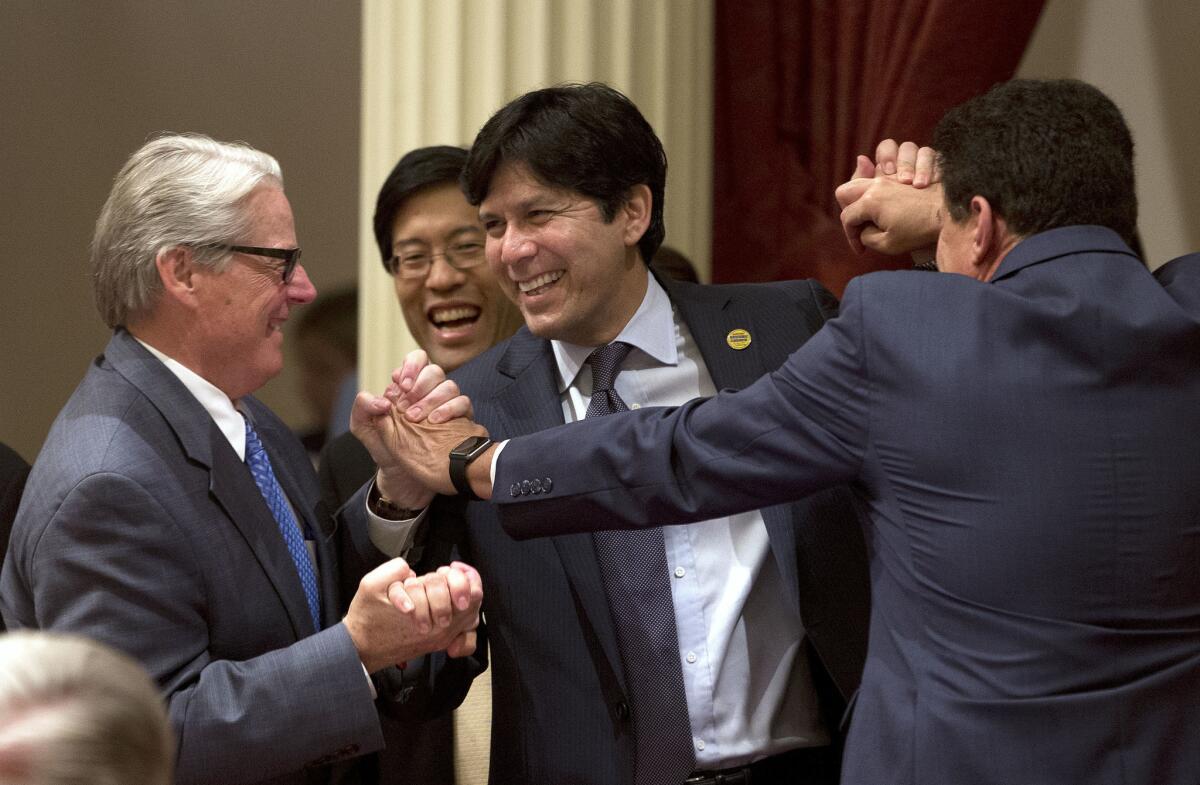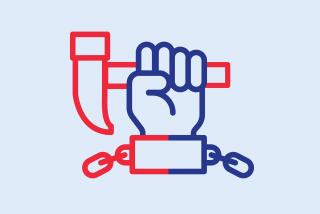Nearly all California workers would be eligible for a retirement plan in bill headed to governor

- Share via
A plan to create a state-run retirement program for nearly all private workers in California passed out of the Legislature late Wednesday and now awaits approval by Gov. Jerry Brown.
But even if the governor signs the bill written by Senate leader Kevin de León (D-Los Angeles), which was opposed by some in the investment industry, the nearly 7 million workers eligible for the plan probaby won’t be able to start parking money in the retirement system until 2018.
The Senate, on the last day of the two-year legislative session, approved Senate Bill 1234, which requires all California companies with at least five employees to either offer their own retirement savings plan or enroll workers in the new California Secure Choice Retirement Savings Program.
Secure Choice would be structured as an individual retirement account but operate much like a 401(k), with a small percentage of every paycheck automatically diverted into the program unless workers take action to opt out.
Workers could take their accounts with them when they change jobs and would face a penalty for withdrawing money before retirement. It has not yet been decided whether the deductions will be made pretax like a traditional IRA or post-tax.
State officials said it will take months, if not more than a year, to work out all the details before the plan can begin enrolling employees.
“To start a retirement savings program from scratch will take some time,” said California Deputy Treasurer Grant Boyken. “It would be very aggressive to have enrollment start next year.”
The Secure Choice program will be overseen by a state board, but most of the work of administering the program — sending account statements, tracking worker contributions and investing money for the program — will be handled by private companies. The board will have to choose those contractors before the program can start enrolling workers.
Once the program starts, it will take as long as three years for all workers to be covered. SB 1234 calls for companies with more than 100 employees to enroll workers within a year of the program’s launch. Smaller employers will have as much as two additional years, depending on their size, to get their workers signed up.
Though the program is aimed at workers who aren’t currently offered a savings plan through work — and who are much less likely to have any of their own retirement savings — some investment industry groups have lobbied against the plan.
Last month, the trade group Investment Company Institute sent a letter to Brown, urging him to veto SB 1234. The group has argued that state-run plans would compete against privately run ones and could amount to unfair competition for the trade group’s members.
The Secure Choice plan is not guaranteed by the state, meaning that if retirement savers lose money, the state would not have to cover those losses.
But the institute, in its letter to Brown, argued that political pressure could force lawmakers to backfill potential investment losses with public funds, essentially turning a state-run retirement program into a state-guaranteed program.
However, the bill had its own powerful supporters, including AARP, the senior advocacy group. It called Wednesday’s passage a landmark step toward making retirement savings a universal benefit despite no requirement for employer contributions.
Deductions would start at 3% of total pay and automatically increase 1 percentage point annually to a maximum of 8%, unless workers choose a different contribution amount.
California is one of a handful of states that has been mulling such programs as a way to head off a looming retirement crisis.
More than half of private-sector workers in the United States are not offered a retirement plan through work, and most workers without such plans don’t save for retirement on their own, according to the National Institute on Retirement Security and AARP.
Those statistics have lawmakers and advocates concerned that many workers will head into retirement without the savings they’ll need to supplement their Social Security benefits.
“Regardless of socioeconomic status, the hard-working people of California who have made our state a global economic powerhouse deserve a measure of financial security in their golden years,” de León said in a statement after his bill’s passage late Wednesday.
Follow me: @jrkoren
ALSO
Congressman calls on Japanese prosecutors to probe Olympus over scope infections
After SpaceX rocket crisis, Elon Musk also faces Tesla safety and cash-flow issues
Stocks notch tiny gains, starting September on a quiet note
More to Read
Inside the business of entertainment
The Wide Shot brings you news, analysis and insights on everything from streaming wars to production — and what it all means for the future.
You may occasionally receive promotional content from the Los Angeles Times.











